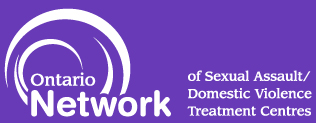

You can access our sexual assault/domestic violence acute services through the emergency department of a hospital that has a Sexual Assault/Domestic Violence Treatment Centre. If there is not an SADVTC in your area, please go to your nearest hospital emergency department for care.
There are 37 hospital-based Sexual Assault/Domestic Violence Treatment Centres across Ontario that provide comprehensive, trauma-specific care and treatment. You can come alone, with a friend, family member, or police. We will support you in the decisions that you make. We are here to help.
ACUTE CARE
Any injuries requiring medical attention such as cuts, broken bones, and head injuries will first be treated by the emergency department staff. The SADVTC clinician will then be contacted to see you.
Services include, but are not limited to:
- crisis intervention/emotional support
- documentation of assault
- assessment and documentation (including photographs) of injuries
- testing and treatment for sexually transmitted infections (STIs) including gonorrhea, chlamydia, HIV, Hepatitis B
- emergency contraceptive options (e.g. "the morning after pill")
- forensic evidence collection
- risk assessment and safety planning
- referrals to community agencies for additional support
NON-ACUTE CARE
Our non-acute service can be accessed during daytime hours by calling your local SADVTC and making an appointment to come in to see the nursing staff. In these instances, we will care for clients who do not come directly to the emergency department. Services vary between Centres.
FOLLOW-UP CARE
Many Centres have a follow-up nurse who will contact you a few days after you have been seen at the Centre, provided it is safe to do so. This contact may be a phone call or an in-person visit, in which case you would return to the Centre. This provides an opportunity for the nurse to:
- check on your emotional and physical wellbeing
- answer any questions
- re-assess your safety and review your safety plan
- re-document and photograph any injuries that may have become more apparent
- re-assess your pain
- inform you of any test results, or perform repeat tests if necessary
- follow up on HIV Post-Exposure Prophylaxis
- help you to access services from other community agencies
For any of the above follow-up services, you may call to book an appointment with the follow-up nurse without having gone through the emergency SA/DV service.
CHILDREN AND YOUTH
Certain Centres have specially trained staff to assess child survivors of sexual abuse/assault. If the Centre most accessible to you does not provide care to children, the child will be referred to another Centre. If needed, counselling services are provided to children, adolescents, and their families.